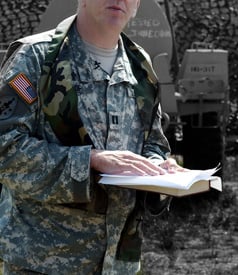 Can Jesus Cure Shell Shock?
Can Jesus Cure Shell Shock?Tuesday 03 August 2010
by: Matthew Harwood, t r u t h o u t | News Analysis
Many Christians believe faith in Jesus Christ can cure almost anything: alcoholism, cancer, homosexuality, even the Son of Sam. But can it cure post traumatic stress disorder in troops returning from Afghanistan and Iraq? The Army Reserves' top chaplain for military policemen believes so, and published his prescription on the Army Reserves' official Web site for everyone to see, in an act a watchdog organization argues is unconstitutional and dangerous when soldiers continue to kill themselves at an alarming rate.
In a nearly 11,000 word essay, "Spiritual Resiliency: Helping Troops Recover from Combat," Command Chaplain Col. Donald W. Holdridge of the 200th Military Police Command at Fort Meade, Maryland, argues belief in Jesus Christ and Bible reading, particularly King David's Psalms, can help cure a soldiers' PTSD. "Combat vets need to know that most of these
do fade in time, like scars," writes Holdridge, a professor at the Baptist Bible College, as the Army Reserves banner hangs from the top of the Webpage. "They will always be there to some degree, but their intensity will fade. What will help them fade is the application of the principles of Scripture."
The tone of Holdridge's essay only gets more unapologetically evangelical as the chaplain's initial wading in a Christian sea slides into more brackish waters, evangelizing soldiers with PTSD that their service was part of a larger theological plan and dangerously merges church and state. "Military and law enforcement personnel bear the additional burden of contending with evil by acting as an arm of the state to punish those who have no respect for human life (Rom.13:4)," he writes. "It is messy business, but necessary in a fallen world. If the military member knows Christ as savior, they can be assured that Jesus is with them until the end of the age (Mt.28:20)." (If this doesn't seem offensive or incendiary for a military Website to publish this, replace "Christ as savior" with "the Prophet Mohammed" and "Jesus" with "Allah.")
Holdridge concludes the essay by recommending further resources for those seeking help with PTSD. By then, soldiers are swimming in the Sea of Galilee. While six of the ten resources deal with nonprofit and government programs like the Veterans of Foreign Wars or the Department of Veterans Affairs, the remaining four are all evangelical organizations that devote significant resources to evangelizing military personnel. One of those organizations, Military Ministry, was unabashed a few years ago about their mission: "Responsibilities include working with Chaplains and Military personnel to bring lost soldiers closer to Christ, build them in their faith and send them out into the world as Government paid missionaries." Military Ministry did not respond to an e-mail inquiry asking for comment.
The question, of course, is whether Command Chaplain Holdridge is acting as an evangelical fisherman, luring soldiers with the bait of normalcy after the psychological fractures of combat. Mikey Weinstein, the founder of the Military Religious Freedom Foundation, the civil rights organization that discovered the essay, argues Holdridge's "Spiritual Resiliency" is a pernicious example of fundamentalist Christianity using the machinery of the state to promote its sectarian worldview.